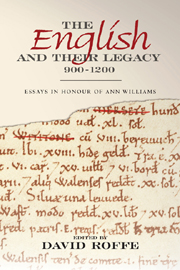Book contents
- Frontmatter
- Contents
- Figures and Tables
- Dedication
- Preface
- Contributors
- Abbreviations
- Ann Williams: a Personal Appreciation
- Life-writing and the Anglo-Saxons
- Meet the Swarts: Tracing a Thegnly Family in Late Anglo-Saxon England
- The Moneyers of Kent in the Long Eleventh Century
- Master Wace: a cross-Channel Prosopographer for the Twelfth Century?
- From Minster to Manor: the Early History of Bredon
- Eadulfingtun, Edmonton, and their Contexts
- The Family of Wulfric Spott: an Anglo-Saxon Mercian Marcher Dynasty?
- The Burial of King Æthelred the Unready at St Paul's
- Eustace II of Boulogne, the Crises of 1051–2 and the English Coinage
- Through the Eye of the Needle: Stigand, the Bayeux Tapestry and the Beginnings of the Historia Anglorum
- Robert of Torigni and the Historia Anglorum
- Invoking Earl Waltheof
- Hidden Lives: English Lords in post-Conquest Lincolnshire and Beyond
- Lordship and Lunching: Interpretations of Eating and Food in the Anglo-Norman World, 1050–1200, with Reference to the Bayeux Tapestry
- The Exchequer Cloth, c. 1176–1832: the Calculator, the Game of Chess, and the Process of Photozincography
- Ann Williams: a Bibliography 1969–2011
- Index
- Tabula Gratuloria
Ann Williams: a Personal Appreciation
Published online by Cambridge University Press: 05 April 2013
- Frontmatter
- Contents
- Figures and Tables
- Dedication
- Preface
- Contributors
- Abbreviations
- Ann Williams: a Personal Appreciation
- Life-writing and the Anglo-Saxons
- Meet the Swarts: Tracing a Thegnly Family in Late Anglo-Saxon England
- The Moneyers of Kent in the Long Eleventh Century
- Master Wace: a cross-Channel Prosopographer for the Twelfth Century?
- From Minster to Manor: the Early History of Bredon
- Eadulfingtun, Edmonton, and their Contexts
- The Family of Wulfric Spott: an Anglo-Saxon Mercian Marcher Dynasty?
- The Burial of King Æthelred the Unready at St Paul's
- Eustace II of Boulogne, the Crises of 1051–2 and the English Coinage
- Through the Eye of the Needle: Stigand, the Bayeux Tapestry and the Beginnings of the Historia Anglorum
- Robert of Torigni and the Historia Anglorum
- Invoking Earl Waltheof
- Hidden Lives: English Lords in post-Conquest Lincolnshire and Beyond
- Lordship and Lunching: Interpretations of Eating and Food in the Anglo-Norman World, 1050–1200, with Reference to the Bayeux Tapestry
- The Exchequer Cloth, c. 1176–1832: the Calculator, the Game of Chess, and the Process of Photozincography
- Ann Williams: a Bibliography 1969–2011
- Index
- Tabula Gratuloria
Summary
Ann Williams is first and foremost an historian of Anglo-Saxon England. She is also an expert on Domesday Book; that has come about because the text of Domesday offers us a window of incomparable detail into the world of eleventh-century England. Domesday was an accidental subject for Ann. As an undergraduate, she had studied with R. R. Darlington at Birkbeck and had done his special subject on the Age of Bede. The subject of King Offa attracted her attention for a doctoral thesis, but Darlington thought better of that and persuaded her to do an edition of the Dorset Domesday; her future as an historian of the eleventh century was thus determined. Her training was rigorous: Darlington expected his full-time research students to see him weekly, with work, and woe-betide the student who failed that demanding schedule. In 1964, Francis Wormald and Sir Frank Stenton examined the thesis, and, in 1968, it appeared as a volume in the Victoria County History series under the general editorship of R. B. Pugh.
Appointed to a lectureship at the North Western Polytechnic in 1965, Ann taught a succession of undergraduates in her own inimitable and charismatic style. Ann's teaching was not limited to the lecture hall or the seminar room, however. I arrived at the Polytechnic of North London in the autumn of 1984 in the midst of a dispute over the admittance of a National Front activist to his Philosophy lectures, and a few weeks into our course, the Kentish Town site was occupied and all formal classes ceased for the remainder of the term.
- Type
- Chapter
- Information
- The English and their Legacy, 900–1200Essays in Honour of Ann Williams, pp. 1 - 4Publisher: Boydell & BrewerPrint publication year: 2012

